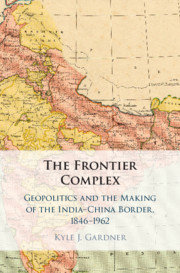Book contents
- The Frontier Complex
- The Frontier Complex
- Copyright page
- Dedication
- Contents
- Figures
- Maps
- Tables
- Additional material
- Preface
- Acknowledgments
- A Note on the Text
- Introduction
- 1 Territory before Borderlines
- 2 Surveys
- 3 Communication
- 4 Reading the Border
- 5 Trans-frontier Men
- 6 The Birth of Geopolitics
- 7 Lines of Control
- Epilogue
- Archives
- Bibliography
- Index
Epilogue
Published online by Cambridge University Press: 21 January 2021
- The Frontier Complex
- The Frontier Complex
- Copyright page
- Dedication
- Contents
- Figures
- Maps
- Tables
- Additional material
- Preface
- Acknowledgments
- A Note on the Text
- Introduction
- 1 Territory before Borderlines
- 2 Surveys
- 3 Communication
- 4 Reading the Border
- 5 Trans-frontier Men
- 6 The Birth of Geopolitics
- 7 Lines of Control
- Epilogue
- Archives
- Bibliography
- Index
Summary
By the time of independence in 1947, the Himalayan region had been a vast laboratory for border making for nearly a century. But the experiments often yielded unexpected and unsatisfactory results. Instead of generating solutions to transform a vague frontier into a clear and legible border, the complex of border-making practices and ideas developed by colonial administrators and experts frequently failed to account for the dynamism of the Himalayas themselves and the people who moved through this vast complex of mountains. Their geological complexity challenged geographers’ assumptions that watersheds neatly aligned with mountain ranges, and their scale challenged surveyors’ ability to comprehensively record them. Like the complex perpendicular spurs running off the central Himalayan range, political space failed to follow neatly mapped borderlines. And the historical movement of peoples, animals, and goods challenged the colonial state’s ability to regulate movement at its territorial edges. Although the precolonial modes of seeing space outlined in the first chapter did not disappear, they became detached from and subordinated to the political view of Ladakh as a single, solid, bounded territory – a territory now appended to the periphery of a massive state, not a historical entrepôt connecting vast swathes of people.
- Type
- Chapter
- Information
- The Frontier ComplexGeopolitics and the Making of the India-China Border, 1846–1962, pp. 251 - 255Publisher: Cambridge University PressPrint publication year: 2021

